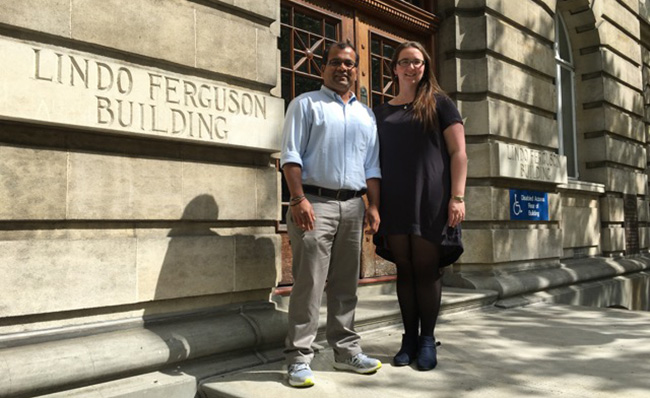 Friday 5 January 2018 11:26am
Friday 5 January 2018 11:26am
Associate Professor Rajesh Katare and first author Ingrid Fomison-Nurse of the University of Otago.
The molecule responsible for heart disease in diabetics has been identified by University of Otago researchers, greatly improving chances of survival.
Associate Professor Rajesh Katare, of the Department of Physiology, says diabetes is an epidemic in New Zealand with more than 110,000 people diagnosed with type-2 diabetes, while 100,000 remain undiagnosed.
The leading cause of death in diabetics is cardiovascular disease.
"Diabetes leads to the progressive loss of heart muscle cells, accelerating ageing of the heart and increasing the risk of heart attack.
"However, the reason for this increased risk is not known. Understanding the reason will help in designing targeted therapies to reduce the risk of heart disease in diabetic individuals,'' he says.
The results of the world-leading study, just published in journal Cell Death & Differentiation, identified the molecule (microRNA-34a) responsible for accelerating the ageing of the heart.
Researchers studied blood samples of type-2 diabetics who were otherwise completely healthy, and heart tissue from both diabetics and non-diabetics.
Their results showed significant elevation of the molecule levels in the blood samples. Importantly, this elevation was observed even in the early stages of the disease.
Its presence in heart muscle cells confirmed the increased levels of the molecule as coming from the heart.
By therapeutically reducing the microRNA-34a levels in the heart muscle cells, they found diabetes induced ageing was significantly reduced, thereby improving chances of survival.
As heart disease in diabetics has such an insidious onset, there is often very little time to diagnose and treat the disease.
"Cardiologists have, until now, not been able to diagnose diabetic heart disease before it has developed,'' Associate Professor Katare says.
This discovery has shown that, by monitoring the level of microRNA-34a in diabetic individuals, doctors can help identify those who are at risk of developing heart disease.
"This will allow GPs to either prescribe lifestyle modification, or closely monitor those individuals who show changes. Importantly, this can be done without the need for sophisticated equipment.''
Another key finding of the study was, for the first time, increased microRNA-34a was identified in stem cells isolated from diabetic heart tissue.
Stem cell therapy is considered the next generation drug therapy for those resistant to conventional treatment, but it is ineffective in diabetic individuals due to defective stem cells.
"In this context, our finding sheds light on the reason behind the poor efficacy of diabetic stem cells,'' Associate Professor Katare says.
Publication details:
Diabetes induces the activation of pro-ageing miR-34a in the heart, but has differential effects on cardiomyocytes and cardiac progenitor cells.
Ingrid Fomison-Nurse, Eugene Eng Leng Saw, Sophie Gandhi, Pujika Emani Munasinghe, Isabelle Van Hout, Michael J.A. Williams, Ivor Galvin, Richard Bunton, Philip Davis, Vicky Cameron, Rajesh Katare.
https://doi.org/10.1038/s41418-017-0047-6
For more information, please contact:
Associate Professor Rajesh Katare
Department of Physiology
Phone: +64 3 479 7292
Email: rajesh.katare@otago.ac.nz
A list of Otago experts available for media comment is available elsewhere on this website.
Electronic addresses (including email accounts, instant messaging services, or telephone accounts) published on this page are for the sole purpose of contact with the individuals concerned, in their capacity as officers, employees or students of the University of Otago, or their respective organisation. Publication of any such electronic address is not to be taken as consent to receive unsolicited commercial electronic messages by the address holder.